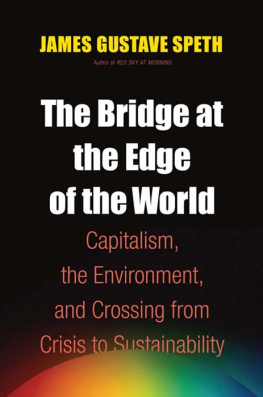Speth - Red Sky at Morning
Here you can read online Speth - Red Sky at Morning full text of the book (entire story) in english for free. Download pdf and epub, get meaning, cover and reviews about this ebook. City: London;New Haven;Conn;United States, year: 2004, publisher: Yale University Press, genre: Romance novel. Description of the work, (preface) as well as reviews are available. Best literature library LitArk.com created for fans of good reading and offers a wide selection of genres:
Romance novel
Science fiction
Adventure
Detective
Science
History
Home and family
Prose
Art
Politics
Computer
Non-fiction
Religion
Business
Children
Humor
Choose a favorite category and find really read worthwhile books. Enjoy immersion in the world of imagination, feel the emotions of the characters or learn something new for yourself, make an fascinating discovery.

- Book:Red Sky at Morning
- Author:
- Publisher:Yale University Press
- Genre:
- Year:2004
- City:London;New Haven;Conn;United States
- Rating:5 / 5
- Favourites:Add to favourites
- Your mark:
- 100
- 1
- 2
- 3
- 4
- 5
Red Sky at Morning: summary, description and annotation
We offer to read an annotation, description, summary or preface (depends on what the author of the book "Red Sky at Morning" wrote himself). If you haven't found the necessary information about the book — write in the comments, we will try to find it.
In this powerful book, a renowned environmental leader warns that despite all the international negotiations of the past two decades, efforts to protect Earths environment are not succeeding.
Speth: author's other books
Who wrote Red Sky at Morning? Find out the surname, the name of the author of the book and a list of all author's works by series.
Red Sky at Morning — read online for free the complete book (whole text) full work
Below is the text of the book, divided by pages. System saving the place of the last page read, allows you to conveniently read the book "Red Sky at Morning" online for free, without having to search again every time where you left off. Put a bookmark, and you can go to the page where you finished reading at any time.
Font size:
Interval:
Bookmark:
Red Sky at Morning
America and the Crisis of the
Global Environment
James Gustave Speth

Copyright 2004 by James Gustave Speth. All rights reserved. This book may not be reproduced, in whole or in part, including illustrations, in any form (beyond that copying permitted by Sections 107 and 108 of the U.S. Copyright Law and except by reviewers for the public press), without written permission from the publishers.
The following publishers have generously given permission to use quotations from copyrighted works. From The Collected Poems of Wallace Stevens by Wallace Stevens, copyright 1954 by Wallace Stevens and renewed 1982 by Holly Stevens. Used by permission of Alfred A. Knopf, a division of Random House, Inc. From The Rain in the Trees by W. S. Merwin, copyright 1988 by W. S. Merwin. Used by permission of Alfred A. Knopf, a division of Random House, Inc. From The Lorax by Dr. Seuss, copyright by Dr. Seuss Enterprises, L.P. 1971, renewed 1999. Used by permission of Random House Childrens Books, a division of Random House, Inc. All rights reserved. From Silent Spring by Rachel Carson. Copyright 1962 by Rachel L. Carson, renewed 1990 by Roger Christie. Reprinted by permission of Houghton Mifflin Company. All rights reserved. From We Who Prayed and Wept by Wendell Berry, from Collected Poems: 19571982, by Wendell Berry. Reprinted by permission of North Point Press, a division of Farrar, Straus and Giroux, LLC. From Bank of Bad Habits written by Jimmy Buffett, Peter Mayer, Roger Guth, Russ Kunkel, and Jay Oliver 1998 Little Flock Music (BMI)/Alsatian Music (BMI)/Administered by Bug Coral Reefer Music/MCA Music Publishing/Olas Music/Jay Oliver Music. All rights reserved. Used by permission.
Printed in the United States of America by R. R. Donnelley & Sons.
Library of Congress Cataloging-in-Publication data will be found at the end of this book.
A catalogue record for this book is available from the British Library.
This book was printed with soy-based ink on acid-free recycled paper that contains postconsumer fiber. The case was manufactured using acid-free recycled paper that contains postconsumer pulps and colors that are ligninand carbon-free.
10 9 8 7 6 5 4 3 2 1
For Cameron
and
The students of the Yale School of Forestry & Environmental Studies
After the final no there comes a yes
And on that yes the future of the world depends. Wallace Stevens
As I write this preface, an unusually severe blizzard is bearing down on Connecticut. Yale is shutting down. My wife is worrying about the children driving, even though they have all been adults for years. The blizzard is forecast to continue through most of the night and to set records. It hardly seems the moment for me to begin fretting again about global warming, but I check the NASA Web-site, and there it is: the bitterly cold January we just suffered through in the Northeast was actually the second warmest January on record globally, going back to 1880. And only a fortnight ago, two Harvard scientists pointed out in an oped article in the Boston Globe that dramatically colder weather in the North Atlantic region is one possible consequence of global warming because the warming could disrupt the Gulf Stream. There is a lesson here. To get it right we should trust science more than our senses, but the science is complicated, often confusing, and sometimes counterintuitive.
It is easy to long for the clarity of the early days of the modern environmental movement when the problems could be seen and smelled and the villains were obvious. Those insults led me and others, fresh out of law school in 1969, to help found the Natural Resources Defense Council. In dozens of lawsuits, we attacked air and water pollution, clear-cutting, strip-mining, stream channelization, and breeder reactors and generally partook in a great moment in American history when extraordinary progress was made in cleaning up and protecting the environment here at home. The 1970s were a wonderful decade for our American environment, beginning with the enactment of the National Environmental Policy Act under President Richard M. Nixon and culminating in President Jimmy Carters protection of Alaskan lands. It was a bipartisan effort, with Democrats like Senator Ed Muskie joining with Republicans like Senator Howard Baker to compile an unmatched record of tough environmental legislation. As a result, air and water pollution have been much reduced in the United States, we did get the lead out (of gasoline), and we have built a remarkable system of parks, wilderness, and other protected areas. Many lakes and rivers have been revived, and forest cover in the United States has increased, not decreased. These successes underscored that America can protect its environment without wrecking its economy.
In the early 1970s the CBS Evening News with Walter Cronkite ran a series of environmental stories entitled Can the World Be Saved? The globe behind this title was firmly grasped by a hand that seemed to come from nowhere. I was never sure whether this hand was crushing our small planet or saving it, but I was sure at least that Cronkite was out to save it. He dramatically presented the much simpler environmental problems of that period to a huge audience and helped build the powerful environmental consciousness of the day.
Today, the question Can the world be saved? is more serious and legitimate than it was then. As we begin the new century, human activities are disrupting the great ecological systems and natural cycles that make our planet habitable, bountiful, and wondrous. Only our heightened care can save the world as we know it. So, the world is indeed in our hands, for good or for ill.
After working through the 1970s exclusively on domestic environmental issues, my realization that even larger challenges were massing on the global front came as a rude awakening. I was serving then as chair of President Carters Council on Environmental Quality, and our efforts at CEQ to prepare the Global 2000 Report to the President brought home to me and others that there was a new agenda of global environmental challenges more threatening and difficult than the predominantly domestic concerns that motivated us in founding NRDC. Climate change, devastation of ocean fisheries, deforestation in the tropics, loss of species, land deterioration, and other unwanted processes were occurring on a frightening scale and pace. I remember thinking that we were building a fools paradise here in America by concentrating on local environmental concerns while ignoring these global-scale ones.
Banished by the 1980 elections, the Carter administration never had a chance to tackle these problems. I was fortunate, however, to find support in 1982 from the MacArthur Foundation to launch a new organization dedicated to these issues, the World Resources Institute. Throughout my decade there and since, WRI has sought to bring global-scale environmental challenges to broad public attention and help find solutions to them. At WRI we were in the thick of the international process that gave rise to the plethora of environmental treaties of the 1980s and 1990s that I discuss in this book.
Superficially, this outpouring of international legislation was similar to the burst of domestic environmental legislation of the 1970s. But, unfortunately, the similarity stopped there. Whereas our national legislation was successful in curbing many environmental abuses domestically, efforts to protect the global environment have largely failed in the sense that the trends in environmental deterioration have not improved and that more of the same will not get us where we want to be in time to head off an era of unprecedented environmental decline. Big trouble is coming down the pikeand coming fast indeed. Thus, the sailors warning in the title.
Next pageFont size:
Interval:
Bookmark:
Similar books «Red Sky at Morning»
Look at similar books to Red Sky at Morning. We have selected literature similar in name and meaning in the hope of providing readers with more options to find new, interesting, not yet read works.
Discussion, reviews of the book Red Sky at Morning and just readers' own opinions. Leave your comments, write what you think about the work, its meaning or the main characters. Specify what exactly you liked and what you didn't like, and why you think so.









